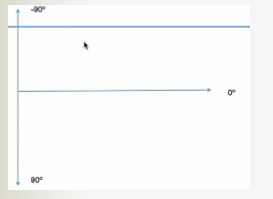iOS开发拓展篇—UIDynamic(重力行为+碰撞检测)
一、重力行为
说明:给定重力方向、加速度,让物体朝着重力方向掉落
1.方法
(1)UIGravityBehavior的初始化
- (instancetype)initWithItems:(NSArray *)items;
item参数 :里面存放着物理仿真元素
(2)UIGravityBehavior常见方法
- (void)addItem:(id <UIDynamicItem>)item;
添加1个物理仿真元素
- (void)removeItem:(id <UIDynamicItem>)item;
移除1个物理仿真元素
2.UIGravityBehavior常见属性
@property (nonatomic, readonly, copy) NSArray* items;
添加到重力行为中的所有物理仿真元素
@property (readwrite, nonatomic) CGVector gravityDirection;
重力方向(是一个二维向量)
@property (readwrite, nonatomic) CGFloat angle;
重力方向(是一个角度,以x轴正方向为0°,顺时针正数,逆时针负数)
@property (readwrite, nonatomic) CGFloat magnitude;
量级(用来控制加速度,1.0代表加速度是1000 points /second²)
二、碰撞行为
1.简介
说明:可以让物体之间实现碰撞效果
可以通过添加边界(boundary),让物理碰撞局限在某个空间中
2.UICollisionBehavior边界相关的方法
- (void)addBoundaryWithIdentifier:(id <NSCopying>)identifier forPath:(UIBezierPath*)bezierPath;
- (void)addBoundaryWithIdentifier:(id <NSCopying>)identifier fromPoint:(CGPoint)p1 toPoint:(CGPoint)p2;
- (UIBezierPath*)boundaryWithIdentifier:(id <NSCopying>)identifier;
- (void)removeBoundaryWithIdentifier:(id <NSCopying>)identifier;
@property (nonatomic, readonly, copy) NSArray* boundaryIdentifiers;
- (void)removeAllBoundaries;
3.UICollisionBehavior常见用法
@property (nonatomic, readwrite) BOOL translatesReferenceBoundsIntoBoundary;
是否以参照视图的bounds为边界
- (void)setTranslatesReferenceBoundsIntoBoundaryWithInsets:(UIEdgeInsets)insets;
设置参照视图的bounds为边界,并且设置内边距
@property (nonatomic, readwrite) UICollisionBehaviorMode collisionMode;
碰撞模式(分为3种,元素碰撞、边界碰撞、全体碰撞)
@property (nonatomic, assign, readwrite) id <UICollisionBehaviorDelegate> collisionDelegate;
代理对象(可以监听元素的碰撞过程)
三、代码示例
在storyboard中拖拽几个控件,用于测试。

测试代码:
YYViewController.m文件
// // YYViewController.m // 12-重力行为和碰撞行为 // // Created by apple on 14-8-6. // Copyright (c) 2014年 yangyong. All rights reserved. // #import "YYViewController.h" @interface YYViewController () @property (weak, nonatomic) IBOutlet UIView *redView; @property (weak, nonatomic) IBOutlet UIProgressView *block1; @property (weak, nonatomic) IBOutlet UISegmentedControl *block2; @property(nonatomic,strong)UIDynamicAnimator *animator; @end @implementation YYViewController -(UIDynamicAnimator *)animator { if (_animator==nil) { //创建物理仿真器(ReferenceView:参照视图,设置仿真范围) self.animator=[[UIDynamicAnimator alloc]initWithReferenceView:self.view]; } return _animator; } - (void)viewDidLoad { [super viewDidLoad]; //设置红色view的角度 self.redView.transform=CGAffineTransformMakeRotation(M_PI_4); } -(void)touchesBegan:(NSSet *)touches withEvent:(UIEvent *)event { //1.重力行为 // [self testGravity]; //2.重力行为+碰撞检测 // [self testGravityAndCollsion]; //3.测试重力的一些属性 [self testGravityAndCollsion2]; //用2根线作为边界 // [self testGravityAndCollision3]; //4.用圆作为边界 // [self testGravityAndCollision4]; } /** * 重力行为 */ -(void)testGravity { //1.创建仿真行为(进行怎样的仿真效果?) //重力行为 UIGravityBehavior *gravity=[[UIGravityBehavior alloc]init]; //2.添加物理仿真元素 [gravity addItem:self.redView]; //3.执行仿真,让物理仿真元素执行仿真行为 [self.animator addBehavior:gravity]; } /** * 重力行为+碰撞检测 */ -(void)testGravityAndCollsion { //1.重力行为 UIGravityBehavior *gravity=[[UIGravityBehavior alloc]init]; [gravity addItem:self.redView]; //2碰撞检测行为 UICollisionBehavior *collision=[[UICollisionBehavior alloc]init]; [collision addItem:self.redView]; [collision addItem:self.block1]; [collision addItem:self.block2]; //让参照视图的边框成为碰撞检测的边界 collision.translatesReferenceBoundsIntoBoundary=YES; //3.执行仿真 [self.animator addBehavior:gravity]; [self.animator addBehavior:collision]; } /** * 测试重力行为的属性 */ -(void)testGravityAndCollsion2 { //1.重力行为 UIGravityBehavior *gravity=[[UIGravityBehavior alloc]init]; //(1)设置重力的方向(是一个角度) // gravity.angle=(M_PI_2-M_PI_4); //(2)设置重力的加速度,重力的加速度越大,碰撞就越厉害 gravity.magnitude=100; //(3)设置重力的方向(是一个二维向量) gravity.gravityDirection=CGVectorMake(0, 1); [gravity addItem:self.redView]; //2碰撞检测行为 UICollisionBehavior *collision=[[UICollisionBehavior alloc]init]; [collision addItem:self.redView]; [collision addItem:self.block1]; [collision addItem:self.block2]; //让参照视图的边框成为碰撞检测的边界 collision.translatesReferenceBoundsIntoBoundary=YES; //3.执行仿真 [self.animator addBehavior:gravity]; [self.animator addBehavior:collision]; } /** * 用圆作为边界 */ - (void)testGravityAndCollision4 { // 1.重力行为 UIGravityBehavior *gravity = [[UIGravityBehavior alloc] init]; [gravity addItem:self.redView]; // 2.碰撞检测行为 UICollisionBehavior *collision = [[UICollisionBehavior alloc] init]; [collision addItem:self.redView]; // 添加一个椭圆为碰撞边界 UIBezierPath *path = [UIBezierPath bezierPathWithOvalInRect:CGRectMake(0, 0, 320, 320)]; [collision addBoundaryWithIdentifier:@"circle" forPath:path]; // 3.开始仿真 [self.animator addBehavior:gravity]; [self.animator addBehavior:collision]; } /** * 用2根线作为边界 */ - (void)testGravityAndCollision3 { // 1.重力行为 UIGravityBehavior *gravity = [[UIGravityBehavior alloc] init]; [gravity addItem:self.redView]; // 2.碰撞检测行为 UICollisionBehavior *collision = [[UICollisionBehavior alloc] init]; [collision addItem:self.redView]; CGPoint startP = CGPointMake(0, 160); CGPoint endP = CGPointMake(320, 400); [collision addBoundaryWithIdentifier:@"line1" fromPoint:startP toPoint:endP]; CGPoint startP1 = CGPointMake(320, 0); [collision addBoundaryWithIdentifier:@"line2" fromPoint:startP1 toPoint:endP]; // collision.translatesReferenceBoundsIntoBoundary = YES; // 3.开始仿真 [self.animator addBehavior:gravity]; [self.animator addBehavior:collision]; } @end
一些测试效果:

代码补充说明:
(1)加速度
速度:point/s
加速度:point/s²
12 * 加速度 * t²
gravity.magnitude = 1000; // 重力加速度越大,碰撞越厉害
(2)重力的方向
坐标如下:

重力方向(二维向量)
说明:给定坐标平面内的一个点。然后用原点(0,0)来连接它,就构成了一个向量。
注意:在IOS中以左上角为坐标原点,向右x增加,向下Y越大。

1 //(3)设置重力的方向(是一个二维向量) 2 gravity.gravityDirection=CGVectorMake(-1, 1);
重力方向为左下角(西南)方向
(3)碰撞检测行为
UICollisionBehavior *collision = [[UICollisionBehavior alloc] init]; [collision addItem:self.redView]; CGPoint startP = CGPointMake(0, 160); CGPoint endP = CGPointMake(320, 400); [collision addBoundaryWithIdentifier:@"line1" fromPoint:startP toPoint:endP]; CGPoint startP1 = CGPointMake(320, 0); [collision addBoundaryWithIdentifier:@"line2" fromPoint:startP1 toPoint:endP];
注意:标识符不能写空。可以写字符串,因为需要标识符需要遵守NSCopying协议,而字符串满足要求。
(4)贝赛尔曲线

提示:这里的path是一个圆,设置宽高不一样,那么得出来的就是一个椭圆。